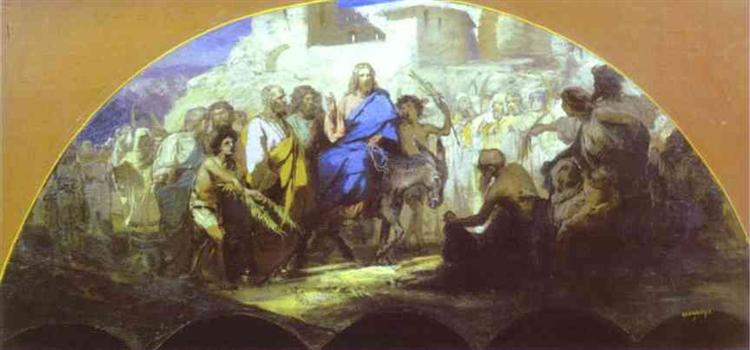Description
The work "Entrance of Christ in Jerusalem" by Henryk Siemiradzki, made in 1876, is a fascinating example of the academic style that characterizes much of the artistic production of the nineteenth century. The painting, loaded with symbolism and historical nuances, portrays a crucial moment in the biblical narrative, where Jesus makes his triumphal entry into Jerusalem, an event that has been interpreted in various artistic manifestations throughout history.
From a compositional perspective, the work stands out for its ability to combine a dynamic movement and a deep solemnity. The central approach of painting is the figure of Christ, magnificent and imposing, which appears mounted on an ass, symbol of humility. His face transmits a mixture of serenity and determination, while his clothing, rich in details, denotes his relevance and spiritual authority. This attention to detail is characteristic of the Siemiradzki style, who was known for his meticulous representation of textures and colors.
Color plays an essential role in this work. The vibrant palette, with predominance of gold, blue and red, creates a festive atmosphere, in contrast to the solemn nature of the event. The crowds surrounding Christ are dressed in varied attire, which reflect the diversity of the society of the time. These characters, although secondary in the central narrative, add a sense of depth and context to the painting. The inclusion of children, elderly and young people in the crowd not only gives life to the scene, but also suggests the universality of the message that Christ came to bring.
Siemiradzki is characterized by its ability to represent light and shadow, which translates into an almost three -dimensional effect on the pictorial surface. The way the light falls on the figures and the environment highlights the majesty of the moment, raising the scene to an almost celestial plane. The architecture of the background, with columns that evoke antiquity, complements the narrative by placing the event in a recognizable historical context, even for the contemporary spectator of Siemiradzki.
The choice of theme is also indicative of the influences of Renaissance art, where interest in biblical narrative was merged with an academic style that favored the truthful and detailed representation of the subjects. Siemiradzki, an outstanding Polish artist who studied in Europe and was influenced by various artistic currents, managed to merge these influences in "Entrance of Christ into Jerusalem", creating a work that is both a tribute to tradition as a personal expression of his ability .
The cultural impact of this piece lies in its ability to connect the past with the present, acting as a bridge between the Christian narrative and the social experience of the nineteenth century. Through its composition, color and the portrait of the crowd, Siemiradzki not only captures a historical moment, but also invites the viewer to reflect on the deep meaning of faith and its relevance in everyday life.
"Entrance of Christ into Jerusalem" is not only a visual representation; It is an invitation to experience, through painting, the encounter between the divine and the human, the ancient and the contemporary, which makes it an imperishable work in the study of religious and narrative art. Siemiradzki achieves, thus, a balance between the great and the intimate, creating an echo of sensations that lasts in the memory of the viewer.
KUADROS ©, a famous paint on your wall.
Hand-made oil painting reproductions, with the quality of professional artists and the distinctive seal of KUADROS ©.
Art reproduction service with satisfaction guarantee. If you are not completely satisfied with the replica of your painting, we refund your money 100%.

